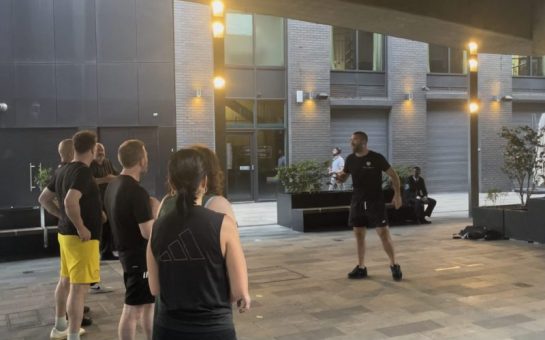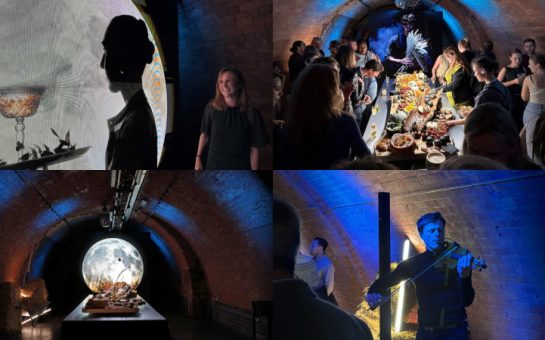“Ethical stripping – is there such a thing?”
This was the response founder of East London Strippers Collective (ELSC), Stacey Clare, received when placing an order to hire chairs for a Shoreditch debate.
There was a pregnant pause.
Realising his faux pas he stuttered a retraction and then apologised.
When he asked if there was anything else he could do, Stacey instructed him: “Google the East London Strippers Collective.”
When she next spoke to him, he sheepishly admitted: “You’ve opened my mind.”
Opening minds and challenging stigma is what ELSC aims to do, and they seem to be doing a pretty good job of it so far.
ELSC was born when Stacey (pictured below) invited fellow dancers to meet for dinner and share their stories back in April 2013.
Fast-forward to October 2015, and they have pulled off an entire festival, The Art of Stripping.
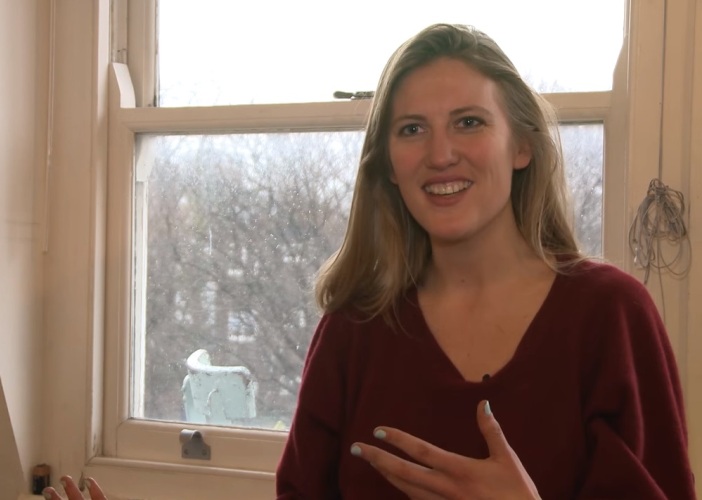
ETHICAL STRIPPER: Stacey Clare founded ELSC in 2013
From a Tarantino-themed Halloween party to an academic symposium, ELSC’s autumn events have celebrated the culture of the striptease through costume, dance, academia, photography and film.
While communal showers and strict rules on any public display of affection at boarding school probably scarred me for life and left me a tad prudish, I’ve always been open-minded.
I consider myself a feminist, in that I believe in the equality of the sexes, but I had no idea where I stood when it came to the ethics of stripping before I encountered ELSC.
“All fully consenting adults have the right to engage in non-traditional sexual activities of their own choice, without fear of judgement or condemnation,” states the ELSC’s manifesto.
The stripper is traditionally the object of the male gaze in stage shows, private dances and lap dances alike.
This doesn’t sit comfortably with those who stand against the objectification of women, but I’m not so prudish so as not to realise that that’s half the fun for performers.
That said, I’m acutely aware of my privileged position as a white British girl with a degree.
I’m free to express my sexuality however I like. I could choose to use my body to generate income if I wanted to, or not.
I’m autonomous, but sadly that’s not the case for all women.
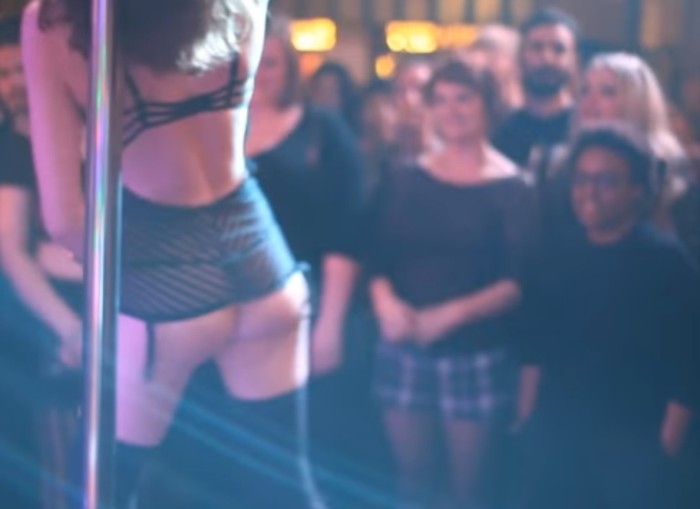
CAN STRIPPING EVER BE ETHICAL? Stacey vows to empower dancers
It’s a concern that Stacey also voiced during a talk hosted by the collective at Shoreditch’s Red Gallery.
She said: “The problem I have is how we can ensure that dancers who don’t have the privileges I have can enjoy their job.
“How can we create the conditions for a fulfilling industry?”
Former TEDx speaker Stacey is weary of journalists, and with good reason.
The first thing most people want to ask the girls in ELSC is what led them to work in the industry.
Stacey said that she doesn’t think they should have to justify and explain their life choices any more than those who opt for other professions.
She said: “I fell into the trap. I gave a lot away.
“People want our life story, but there’s no research about the owners and managers of the clubs.
“Where’s the database of house fees?
“Who owns these clubs, and where does their money go?
“If I did the TED talk again I’d do it differently. I want to deflect and direct attention.
“I don’t need to be analysed or deconstructed any more than people who work in coffee shops, or bankers.”
Poor working conditions and the recent licensing laws brought in under former Deputy Labour Leader Harriet Harman, such as the Policing and Crime Act of 2009, are big on ELSC’s agenda.
Under the new ruling venues must reapply for licenses yearly while they are also restricted from advertising.
The skills associated with the industry, such as personability and entertainment, are not officially recognised so it’s difficult for strippers to argue for labour rights.
Many girls operate on a so-called ‘false self-employed’ basis, whereby they are seen as self-employed but are in reality subjected to high levels of control, from arbitrary fines to restricted hours and the termination of work without warning from venue bosses.
Lap dancer Nadine Quashie, who sued Stringfellows in 2011, was found by the Court of Appeal to lack the status as an employee to file an unfair dismissal claim due to there being ‘no mutual obligation’.
It’s the same old zero-hours fallacy that we see penalising workers in other sectors.
‘Edie’, who has worked as a stripper at the Nag’s Head strip pub in Whitechapel and at The Flying Scotsman in Kings Cross, said: “Harriet Harman and anti-sex puritanical groups like Object just want to ban things.
“As a result of their act we have fewer employment rights.
“It’s the ‘feminists’ who are denouncing other women.”
She makes a powerful argument. Clearly, the sex industry is going nowhere – it’s the oldest profession in the world, and I can’t help but think Edie is right in her conviction that repression can never lead to a feminist utopia.
ELSC urgently fears the nil policy backed by campaign groups such as Object.
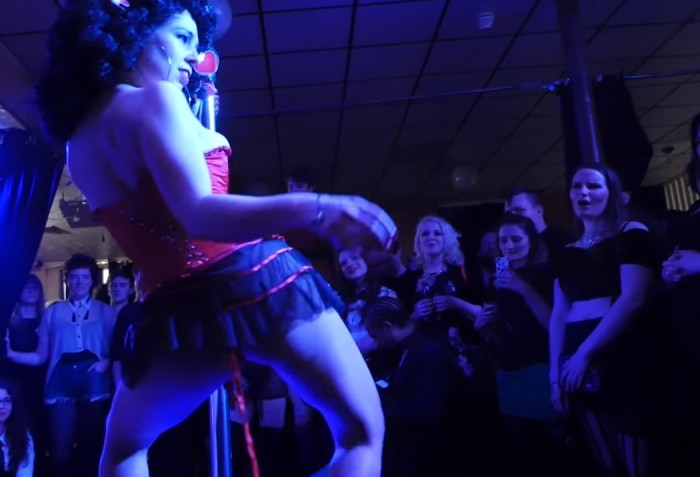 OPPRESSION OR EMPOWERMENT? ELSC and Object hold opposing views
OPPRESSION OR EMPOWERMENT? ELSC and Object hold opposing views
The policy enables councils to enforce a blanket ban on licenses for any new sex entertainment venues and has been enforced by a number of councils across the UK, as was the case for Hackney in 2011.
Object campaigns officer Betiel Baraki said: “Sexual performances by women for money run counter to efforts to achieve genuine equality between men and women.
“We know cultural misogyny provides a conducive context for violence against women.
“We must end all of the ways in which women are viewed and treated as less than fully human.
“Councils now have the power to impose crucial controls and conditions on licences. It can consult communities to limit the proliferation of clubs by setting a cap – which can be zero.
“These reforms challenge the normalisation of the sex industry, and send out a crucial message that buying a lap dance is not the same as buying a cappuccino.
“The presence of strip clubs in a locality increases demand for nearby prostitution services.”
But punitive licensing can force women underground from club or pub environments into private party scenarios, without the security afforded by CCTV and with a higher risk of exploitation and violence.
The best way to help them, ELSC argues, is not to remove their livelihood which is unlikely to disappear in any case.
Another problem for members of ELSC is that the stripping scene in London is becoming more and more Americanized, with clubs replacing traditional strip pubs.
Nowadays owners and managers control the finances from above.
On top of stage fees, girls are often sold their own ‘uniforms’ by the clubs, which are often known to impose arbitrary fines on girls for minor offences such as chewing gum or not having the right outfit.
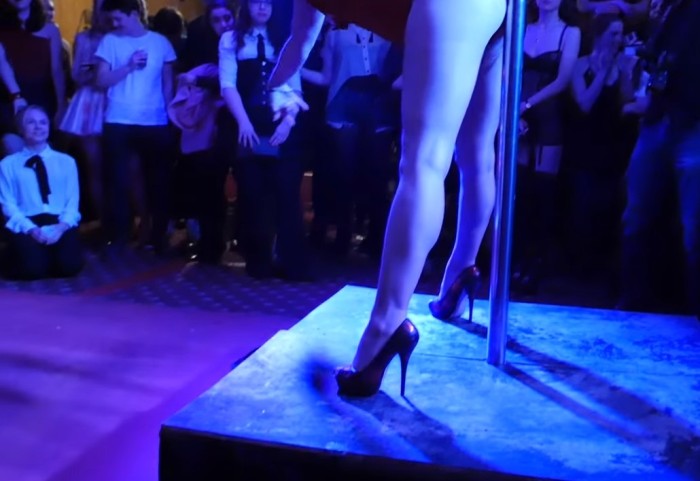 WORKERS’ RIGHTS: ELSC want to bring in a new employment status for strippers
WORKERS’ RIGHTS: ELSC want to bring in a new employment status for strippers
However a lawyer who spoke at ELSC’s live debate is hopeful that there is scope within the new licensing frameworks to establish better standards, for example, Camden and Bristol councils now prohibit arbitrary fining by managers.
Bringing in a new worker status for strippers, providing basic protection such as a minimum wage and holiday pay, could also improve their situation.
However she admitted that this could be a double-edged sword since complaints and campaigns about working conditions can be used as further ammunition to close down sex entertainment venues down.
Gentrification is mooted as another problem facing London’s striptease scene.
‘Edie’ laments the good old days of pub culture, fondly remembered as time of ‘pie and mash’ and cheerful punters who would pass round a jug for tips at the end of the show.
‘Edie’ said: “The Nineties were different from nowadays.
“Shoreditch wasn’t cool and it was full of cabbies and builders.
“There were plentiful jug collections and the dancers had more power.
“There was a sense of community and no one paid stage fees.
“There was a changing atmosphere coinciding with the smoking ban and the recession – the recession put the fear of God into the City boys.”
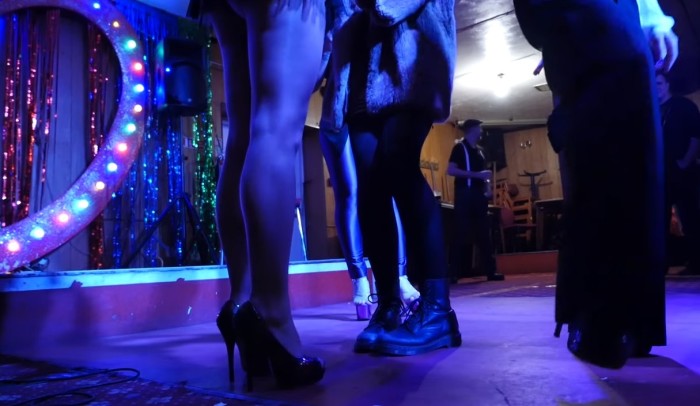 CHANGING TIMES: The recession ‘put the fear of God into the City boys’
CHANGING TIMES: The recession ‘put the fear of God into the City boys’
Some may argue that there’s a class argument going on here as well as a moral argument.
I do wonder how a middle-class yummy mummy who might oppose a strip tease venue – possibly due to the impact it would have on the value of her house – would feel if she was banned from practising her downward dog in yoga while enjoying the attentions of her male personal trainer.
What if she was prevented from running a lucrative side-line teaching Zumba?
I know I’m influenced by media representation and stereotypes, and I’m glad I took the opportunity to find out more about the industry.
I’ve come away with a greater understanding about the reality of stripping and sex work in the UK, but even more nagging questions than before.
I want to know who is controlling the way that sexual desire is played out, and how working conditions can be improved.
The sex industry, like so many other aspects of London life, is changing. But how can we ensure that it evolves in an ethical way?
Images courtesy of Souleyman Messalti via YouTube, with thanks
Video courtesy of TEDx talk via YouTube, with thanks
